“I drink your milkshake! I drink it up!” – Some scenes in film and TV are so memorable they transcend their origin and become part of film culture. In this series, we take a look at what makes those scenes so beloved. We’ll break down why the scene works and what it demonstrates about the screenwriting craft.
Understanding what turns a good scene into a great scene is illuminative when writing a screenplay. By looking at the finished product on screen, screenwriters can learn new tools to apply to their own writing.
In this article, we deep-dive into the most famous scene from There Will Be Blood, written and directed by Paul Thomas Anderson. The scene will forever be known as the “I Drink Your Milkshake” scene.
Table of Contents
Why this Scene?
Many film quotes speak succinctly to what they’re about. Not in this case. The phrase “I Drink Your Milkshake!” when taken in isolation makes little sense, although it is funny. Though distinctive, the phrase’s ubiquitousness comes from how it is specifically used within There Will Be Blood.
There Will Be Blood is a film about the meteoric rise of American oil prospector Daniel Plainview. It’s also about the corrupting power of greed and the stranglehold of religion. The film is a masterpiece of dramatic filmmaking which personifies this old adage:

The Milkshake scene is the finale of There Will be Blood. Plainview has moved from tenacious trailblazer to rich, successful oil tycoon. In this process, he has alienated those closest to him. Plainview’s private hurt is revealed in his fondness for destructive, hurtful language. His hubris, together with the toll of his sacrifice, has turned him into a barely functioning alcoholic.
The “I Drink Your Milkshake” scene shows the confrontation between Plainview and Eli Sunday, a preacher whose church resides on a neighbouring oil field. Eli’s character personifies an unhealthy relationship between religion and American wealth and capitalism.
Previously, Eli had publicly humbled Plainview by confronting him about abandoning his son, HW. Since then, Plainview has revealed that HW was just a “bastard from a basket” and not his son. This causes HW to walk out on him, also threatening to compete with him business-wise. So all this has pushed Daniel into decline.
Without this foreknowledge, the “I Drink Your Milkshake” scene still works as a feat of dramatic tension, if bordering on farce. With this knowledge though, one can see the additional layers of meaning Anderson weaves into this final scene.
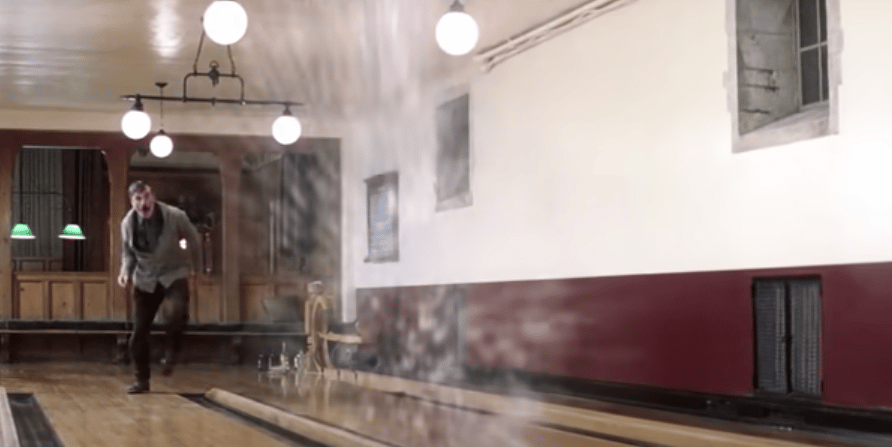
Letting the Setting do the Work
Production design is something that screenwriters should consider in their script writing. The “I Drink Your Milkshake” scene takes place in an unusual space, a spacious private bowling alley. Something feels off and claustrophobic as Eli arrives to speak with Plainview. This production design elevates the scene for a number of reasons. Everything feels closely attuned in order to speak to the story and its themes.
For example…
- This set takes a pastime accessible to many – bowling – and elevates it to an otherworldly, wealthy pursuit by making it private, empty and devoid of emotion. It’s a symbol of capitalist decadence, a somewhat American tradition turned into something akin to a trophy.
- Bowling alleys are noisy and celebratory. Here, the majority of the sound comes only from the two voices until later on in the scene.
- Milkshakes are often consumed in bowling alleys. When the drink is mentioned it doesn’t feel out of place as it represents youthful decadence.
- We are unused to seeing Plainview in the modern trappings of wealth. He wears a soft cardigan. On the surface he has finally gentrified, yet it’s strange to see.
- There is little natural light. Instead, we see bright orb-shaped bulbs which mimic real light. The bulbs are too bright, reflecting the shiny polished floor. The alley is an ivory cage of Plainview’s own making.
- The bowling alley also includes a prominent bar with wood panelling reminiscent of the pulpit. This frames Eli when he sits.

- Seen above, to Eli’s left, are two glasses which Plainview uses to pour two shots of bourbon for himself. These remain in shot for the first third of the scene, constantly reinforcing Plainview’s spiteful nature.
- Many empty bottles are lined up by Plainview’s feet, not unlike the bowling pins which appear later.
- The scene drips with religious iconography too. Eli flaunts his status wearing a large gaudy pearlised cross. Moreover, the set and costumes emphasize the competing and equally corrupting forces of religion and capitalism.
The Pinpoint Dialogue of a Two-Hander
The dialogue is fundamental to the success of the “I Drink Your Milkshake” scene. Scenes should either move the plot forward or expand character. And the dialogue used in this scene effectively achieves both of these goals.
Screenwriters and fans are quick to describe the entire scene by imitating the lines “I drink your milkshake! I drink it up!”. However, so much is achieved with the dialogue spoken before those immortal lines are uttered.
The scene covers about seven pages of the There Will Be Blood script, which is on the longer side of scene lengths in the film. Eli begins the scene with a flamboyant entrance and word repetition:
“Daniel. Daniel. Daniel Plainview….it’s Eli.”
Daniel immediately establishes his contempt for Eli with one line:
Yes, yes it is…”
The early dialogue fixes the film’s endgame from the start. Eli continues to be contrite, sycophantic and fawning, using many words and florid sentences. Plainview can see that Eli wants something and speaks curtly to manoeuvre Eli into revealing the true purpose of his visit.
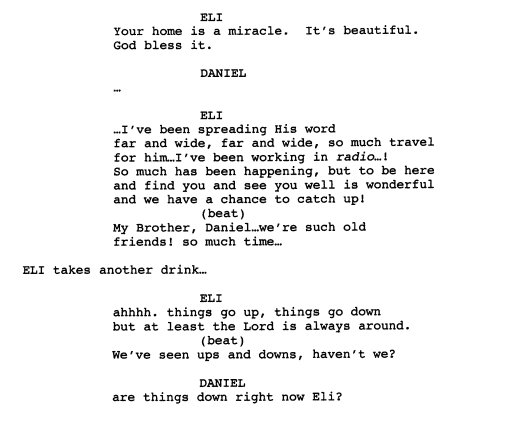
The last line above shows how Plainview already knows that it is impossible for Eli to get what he is asking for. But neither the audience nor Eli understands this yet. Anderson repeatedly uses very precise sentence structure to convey Plainview’s disdain for his former cohort, and his desire to make Eli suffer.
Plainview, for example, hits Eli straight at the heart of his pain:
I’d like you to tell me that you are, and have been a false prophet. And that God is a superstition.
This is part of how Daniel punctures Eli’s outer surface and begins to cause him to unravel.
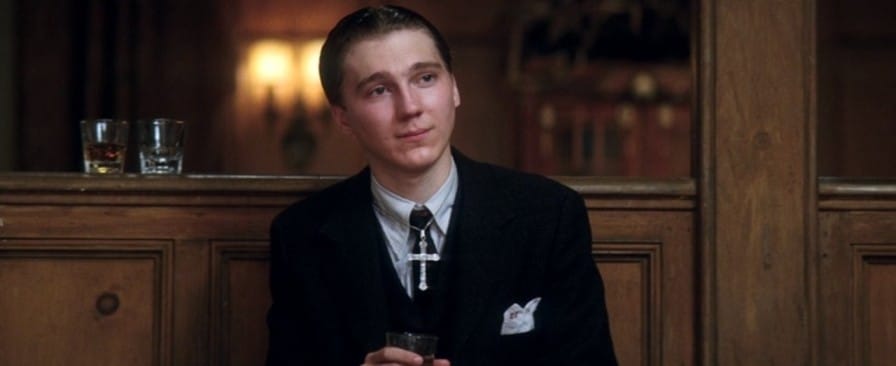
Character Arcs
Screenwriters looking to write unforgettable character studies can take many lessons from the “I Drink Your Milkshake!” scene. How the characters gradually move from certain positions and perceived roles to others helps make the scene compelling to watch.
The scene uses direction and dialogue to convey jostling equity between the two men. Eli begins the scene with initial dominance as the scene plays out:
- Plainview starts the scene flat on his face, his lowest point. Eli stands at his highest stature.
- Eli is well-dressed and sober compared to the drunk Plainview.
- Eli attempts to control Plainview’s temper by evoking feelings of familial love as they sit down opposite one another, now at the same height.
- But Eli quickly cannot help but reveal his desperate need for Plainview’s love, acceptance and money. He sinks lower, physically and morally.
- Eventually, his face grows puce as he reveals his dire financial troubles. He begs Plainview to invest in the drilling of his oil field.
At this point, Plainview rises, establishing his true dominance over Eli.
The scene moves on to Plainview’s arc.
- Plainview, accustomed to being inside, has been freed from a hat to protect him or signify his status.
- He begins to quietly chastise Eli, bargaining with him, standing over him, flattering Eli’s brother Paul, and revealing that it was Paul who had already alerted him to Eli’s financial issues.
- He then begins to prod and push Eli. The shot moves to a side-on two-shot with Plainview standing over Eli, alerting us to the potential threat of physical violence.
- We are at the halfway point and Plainview moves in for the kill. He ramps up his epithets, years of pain and anger tumbling out in a hailstorm of words and actions like, “You’re just the afterbirth that slivered out on your mother’s filth”.
- The pinnacle of his controlled strength and dominance over Eli peaks at the delivery of the line “Drainage”, which Plainview screams at Eli.
“I Drink Your Milkshake. I Drink it Up!”
Anderson finishes the upswing of Plainview’s arc and shows how this character also cannot control his nature. The most famous lines in this scene come two-thirds of the way in and mark the turning point between static tension and plot reveal to frenetic physical action.
For the first time in minutes, the camera moves with Plainview as he strides away. He compares the drainage of Eli’s oil deposits with using a straw to drink another person’s milkshake. Plainview’s delivery is lighthearted, like he’s telling a joke. We hear the words echo, reinforcing that the two men are alone in a large empty space.
We then see the most famous image from this scene. Plainview points his finger right by Eli’s face, a threatening movement. This also reflects upon Christian imagery. The pointed finger is often used in art where it points upwards to signify moving towards heaven. Plainview’s finger pointing down speaks volumes about his moral descent.
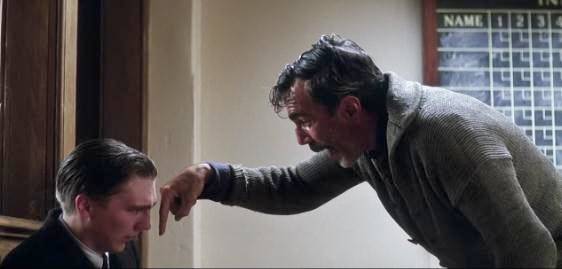
It is the statement of the words milkshake and drink that trigger Daniel’s rage to boil over. The thickness of milk makes it more solid than water. It speaks of breast milk, the milk of human kindness. Not much can cut deeper than the draining of the purity of milk. It’s lost innocence, lost purity; something that reflects Eli’s state at this moment.
A Breathtakingly Cruel Denouement
The scene now moves to its natural violent, physical conclusion. Here screenwriters can note Anderson’s script direction to signify the change of pace as dialogue starts to become redundant:
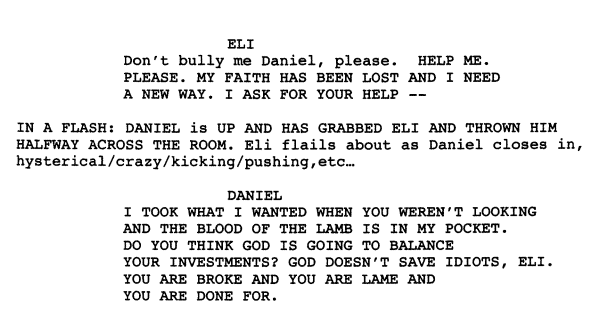
Plainview now treats Eli as a bowling pin.
- He viciously hurls balls at him as the camera moves further away, showing the growing distance between their world views.
- We can see bowling pins standing in a ten-pin family, all uniform.
- Plainview seeks to flatten both Eli and the pins and Anderson uses long shots as if showing a person bowling.
- Eli tries to escape but cannot, now fully realizing the danger he is in.
- Plainview takes the bowling pins and uses them as clubs. At first, he throws them at Eli and then, once Eli has fallen to the floor…
- The camera moves to Eli’s view looking up at Plainview who, in an orgy of violence, viciously clubs him…to death.
Eli lies prostrate at Plainview’s feet, further Christian iconography mirroring Plainview’s position at the start of the scene.
But Anderson has not yet finished the scene. He wants to hammer home the gory conclusion of Plainview’s violence and deliver the title of his film.

Eli’s body has been drained of its own liquid – his blood. This highlights the film’s conclusion that where there is unchecked greed, there will be blood. Or it’s a prophecy come true. The film title has promised us blood, and here it is in no uncertain terms.
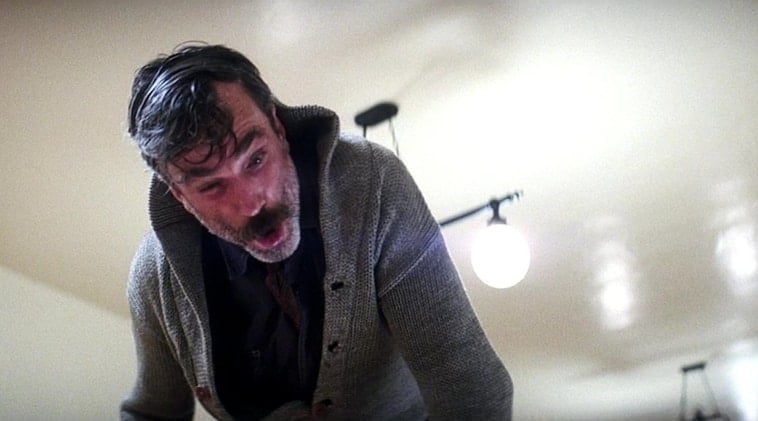
The Perfect Coda
After all of this, Anderson has still not yet finished the scene. What he does next is a lesson for screenwriters on how to use humor and wordplay to perfectly conclude a scene. Once Plainview has beaten Eli to death he proclaims loudly…
I’m finished!
The word ‘finished’ is perfectly used here to demonstrate multiple meanings.
- Plainview acknowledges that he has finally completed what he needed to do to free himself from the guilt of killing the man who was pretending to be his brother, which Eli had used to shame him.
- ‘Finished’ can also mean the consumption of something to its end, or perhaps to put it another way to “drink it all up“. Daniel seems spent by his exertion of violence, he’s drunk up everything he can.
- There is further, ironic meaning. ‘Finished’ can refer colloquially to someone’s livelihood being over due to their actions. We hope that Plainview does not escape punishment for his actions and therefore any semblance of a career or full life is finished.
Moreover, the end harkens back to the opening of the film. Plainview is introduced as a man whose grim determination means he will do whatever is necessary. Here he sits, legs spread by Eli’s prostrate form. We do not know if he has won or lost. Either way, his journey is “finished”.

Drink Up the Hidden Meaning
Finally, screenwriters can consider how using strange language can elevate their storytelling. The “I Drink Your Milkshake” scene never overly explains its dialogue choices, so as not to ruin the subtlety and mystery for the audience.
Drinking milkshake was first used as an allegory to the illegal drainage of oil drainage in real-life legal testimony by the American Senator Albert Fall during an investigation into corrupt practices. Anderson took this fact and used it to make a great visual analogy in a fictional story.
It is also rumoured that the oil used in filming There Will Be Blood contained a substance that fast food franchise McDonald’s allegedly uses in the production of their chocolate milkshakes. So there is meaning upon meaning here, commentary upon commentary.
Most of all, the “I Drink Your Milkshake” scene highlights how dialogue and character interaction can acutely sum up a story’s themes and message. The scene not only provides a devastating conclusion but encapsulates what the film has been about. And we, as the audience, drink it up.
–What did you think of this article? Share It, Like It, give it a rating, and let us know your thoughts in the comments box further down…
– Struggling with a script or book? Story analysis is what we do, all day, every day… check out our range of script coverage services for writers & filmmakers.
This article was written by Sarah-Louise Dean and edited by IS staff.
Get *ALL* our FREE Resources
Tackle the trickiest areas of screenwriting with our exclusive eBooks. Get all our FREE resources when you join 60,000 filmmakers on our mailing list!

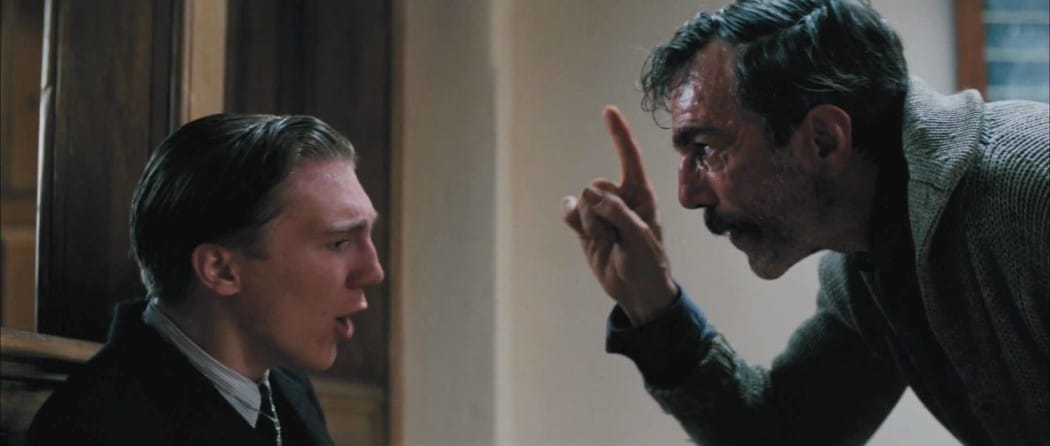
While Plainview’s declaration could have multiple meanings, the intonation tells us that the murder of Eli hasn’t rendered Plainview’s own life finished, rather that he has finally accomplished what he set out to do since 1911. His hatred of mankind, eventually including his own son, has left him alone and mad.